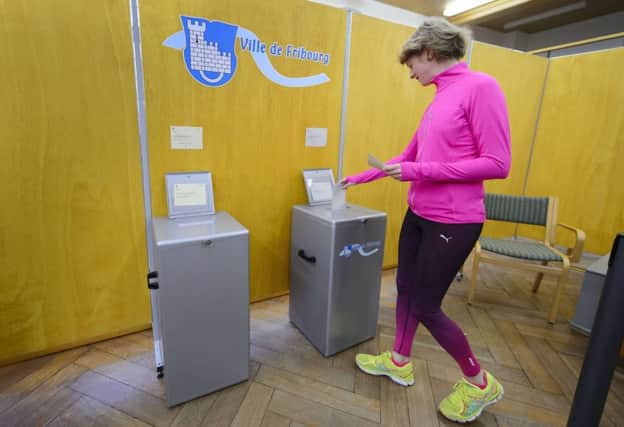Nationalist party on track to win in Swiss election


RTS Television said the Swiss People’s Party collected 28 per cent of the national vote, and appears set to add 11 seats for a total of 65 in the 200-seat lower house of parliament. The leading free market party and the smaller Christian Democrats also gained ground.
That largely matched pre-election poll estimates. But in one surprise, the Social Democrats – the country’s second-largest party – lost support. Other smaller centrist parties and two Green movements also retreated, as had been expected.
Advertisement
Hide AdAdvertisement
Hide AdThe People’s Party has seized on concerns about migration to Europe, which pre-race polls suggested was the leading issue in voters’ minds.
In the aftermath of a 2014 referendum to limit the number of immigrants from the EU, concerns about the refugee crisis were the chief concerns among Swiss voters in recent weeks.
Although the wealthy Alpine country is yet to be affected by the crisis, nearly half of respondents in a survey said it was their number 1 concern. National identity is an important issue in a country where roughly a quarter of the 8.2 million population are foreigners and immigration has increased in recent years.
Migrants will make up half of Switzerland’s population by 2030, the SVP warned in one of its campaign newsletters ahead of the elections.
“The dominant issue in the campaign has been asylum seekers and migration policy, and the SVP is seen as the best party to handle these problems,” said Lukas Golder, spokesman for polling institute GFS Bern, speaking before the election results were finalised.
“There have been concerns that the system could be destabilised by people who cannot be integrated into the country.”
Switzerland’s pension system, the country’s unemployment rate and its relationship with the European Union were the other key issues, although all lagged behind immigration in voters’ deliberations, according to pre-election polls. As well as the 200 seats in the National Council, or lower house of parliament, Swiss voters will also vote for the 46-seat Council of States, the country’s upper chamber, where the results are expected to be finalised toward the end of November.
The make-up of Switzerland’s seven-member cabinet, also known as the Federal Council, will only be decided in a ballot on 9 December following negotiations between the parties and a combined vote of both houses of parliament. Traditionally, the cabinet contains members from all of the major parties
Advertisement
Hide AdAdvertisement
Hide AdStill, the parliamentary election is unlikely to trigger a radical change in the short term. Power sharing and consensus are usual in Switzerland, while the tradition of direct democracy allows citizens to raise concerns outside national elections.
“Elections in Switzerland don’t mean a change in government and there is unlikely to be wholesale changes,” said Joachim Blatter, professor of political science at the University of Lucerne.
“The government in the last four years has been more centrist, but if the SVP and the FDP gain a majority in the Federal Council, it will be more economically liberal and more nationalist at the same time.”